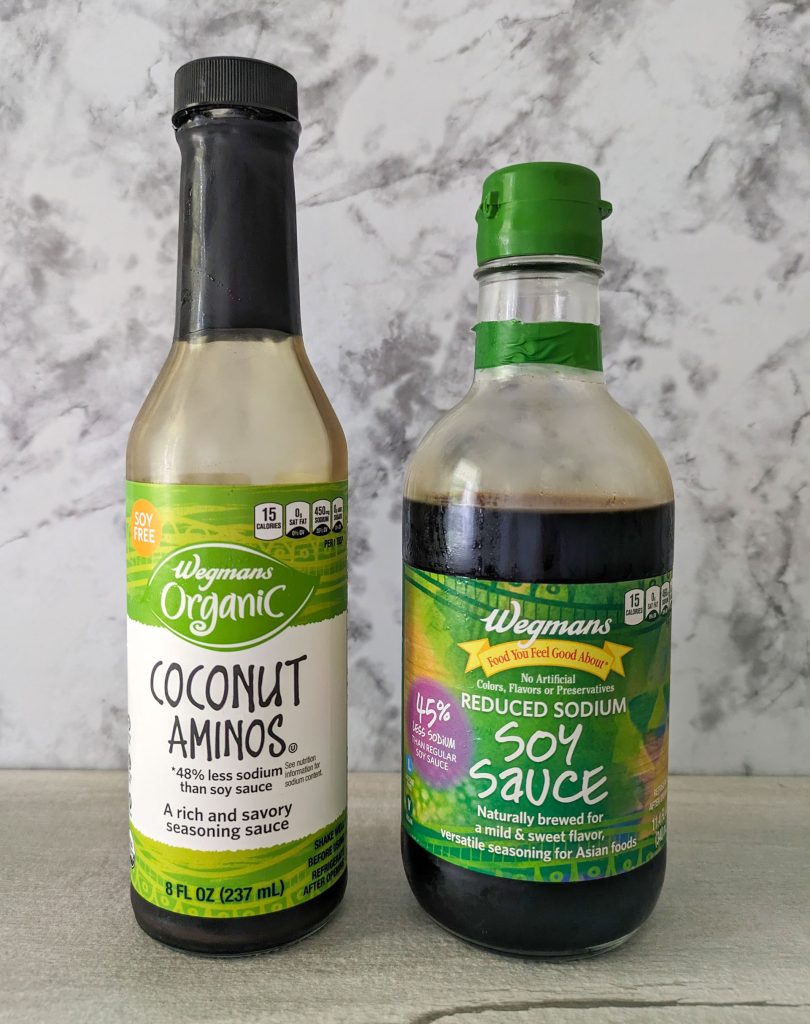Introduction
Condiments play a vital role in enhancing flavors and adding richness into dishes. A well known flavor enhancing condiment in Asian inspired dishes is the salty, umami Soy Sauce. The word umami means “essence of deliciousness” in Japanese. It’s described in America as a savory, deliciousness that enriches flavor. One tiny taste of soy sauce and you know it’s loaded with salty goodness. As we evolve, so do our quests for healthier alternatives of the foods we love. Enter in: Low Sodium Soy Sauce and Coconut Aminos.
I did a little research to inform myself, and you, about each of these products so you can decide which is the best choice for your health, taste and dietary preferences. Oh and because… What is Coconut Aminos anyways? Sounds like something produced in a science lab, right? Let’s dive in.
Coconut Aminos: The Sweet and Savory Alternative
Coconut aminos have gained attention as a popular soy sauce substitute, particularly among those seeking gluten-free or soy-free alternatives. Derived from the sap of coconut blossoms, coconut aminos offer a naturally sweet and umami flavor. Factors to consider:
- Flavor Profile: Coconut aminos boast a mild, slightly sweet taste with subtle hints of umami. Its delicate flavor makes it an excellent choice for marinades, dressings, and stir-fries.
- Sodium Content: Coconut aminos are naturally low in sodium, making them a desirable option for those watching their salt intake. (270 mg/tablespoon vs. 879 mg/tablespoon in traditional soy sauce)
- Health Benefits: They contain essential amino acids and B-vitamins, contributing to a potentially more nutrient-rich choice compared to soy sauces. Coconut aminos are also suitable for people with soy or gluten sensitivities.
Traditional Soy Sauce: The Umami Powerhouse
Soy sauce, originating from fermented soybeans and wheat, has a long history in Asian cuisine. Its strong umami flavor makes it a staple in various dishes. Factors to consider:
- Flavor Profile: Traditional soy sauce offers a rich, salty, and savory umami flavor, making it an ideal choice for seasoning, dipping, and sautéing.
- Sodium Content: Traditional soy sauce tends to be higher in sodium compared to its low sodium counterparts, which can be a consideration for individuals on restricted sodium diets. (879 mg/tablespoon vs. 600 mg/tablespoon in low sodium soy sauce)
- Versatility: It’s a versatile ingredient, suitable for a wide range of dishes, from sushi and stir-fries to soups and marinades.
Low Sodium Soy Sauce: A Reduced-Sodium Alternative
Low sodium soy sauce is a modified version of traditional soy sauce, designed to provide the same umami punch while minimizing sodium intake. Factors to consider:
- Flavor Profile: Low sodium soy sauce maintains the signature umami flavor of traditional soy sauce, albeit with a milder saltiness.
- Sodium Content: As the name suggests, low sodium soy sauce contains less sodium than its traditional counterpart, making it a suitable option for those striving to reduce sodium intake, or with high blood pressure. (600mg/tablespoon vs. 879 mg/tablespoon in soy sauce)
- Culinary Uses: It can be used in place of traditional soy sauce in most recipes, ensuring a healthier option without compromising on flavor.
So which sauce is right for you?
The choice between coconut aminos, soy sauce, and low sodium soy sauce ultimately depends on your dietary needs, individual taste preferences, and culinary uses. If you’re seeking a gluten-free or soy-free option with a touch of sweetness, coconut aminos might be your go-to. If you’re a fan of bold umami flavors and don’t mind sodium, traditional soy sauce could be your best friend. For those looking to strike a balance between flavor and sodium reduction, low sodium soy sauce provides a suitable compromise.
Whichever of these sauces you choose, remember that moderation is key. I know, whomp whomp! They are rich in sodium and should be enjoyed in moderation.



